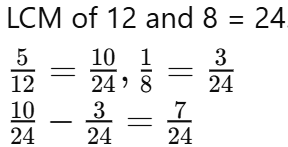Class 7 Exam > Class 7 Notes > Mathematics (Ganita Prakash) Class 7 - New NCERT > Very Short Question Answers: Working with Fractions
Class 7 Maths Chapter 8 Very Short Question Answer - Working with Fractions
Q1: Simplify:
Ans: LCM of 9 and 3 = 9.
Q2: Simplify: 
Ans:
Q3: Find: 
Ans:
Q4: Simplify: 
Ans:
Q5: A chocolate bar weighs kg. If
kg. If  kg is eaten, how much is left?
kg is eaten, how much is left?
Ans:
Q6: If a wall is 5/6 painted, how much is unpainted?
Ans:
Q7: Convert  into an improper fraction and subtract
into an improper fraction and subtract .
.
Ans:
Q8: Convert into an improper fraction and divide it by
into an improper fraction and divide it by  .
.
Ans:
The document Class 7 Maths Chapter 8 Very Short Question Answer - Working with Fractions is a part of the Class 7 Course Mathematics (Ganita Prakash) Class 7 - New NCERT.
All you need of Class 7 at this link: Class 7
|
41 videos|316 docs|8 tests
|
FAQs on Class 7 Maths Chapter 8 Very Short Question Answer - Working with Fractions
| 1. What are fractions and how are they used in everyday life? |  |
Ans. Fractions represent a part of a whole and are used in various everyday situations, such as cooking (measuring ingredients), shopping (calculating discounts), and dividing items among people.
| 2. How do you add and subtract fractions? |  |
Ans. To add or subtract fractions, you need a common denominator. If the denominators are the same, simply add or subtract the numerators. If they are different, find the least common denominator, convert the fractions, and then perform the operation.
| 3. What is the difference between proper and improper fractions? |  |
Ans. A proper fraction has a numerator smaller than its denominator (e.g., 3/4), while an improper fraction has a numerator that is equal to or larger than its denominator (e.g., 5/4 or 3/3).
| 4. How can you convert a fraction into a decimal? |  |
Ans. To convert a fraction into a decimal, divide the numerator by the denominator. For example, 1/4 equals 0.25 when you divide 1 by 4.
| 5. What are equivalent fractions and how do you find them? |  |
Ans. Equivalent fractions are different fractions that represent the same value (e.g., 1/2 and 2/4). You can find equivalent fractions by multiplying or dividing both the numerator and denominator of a fraction by the same number.
Related Searches
























